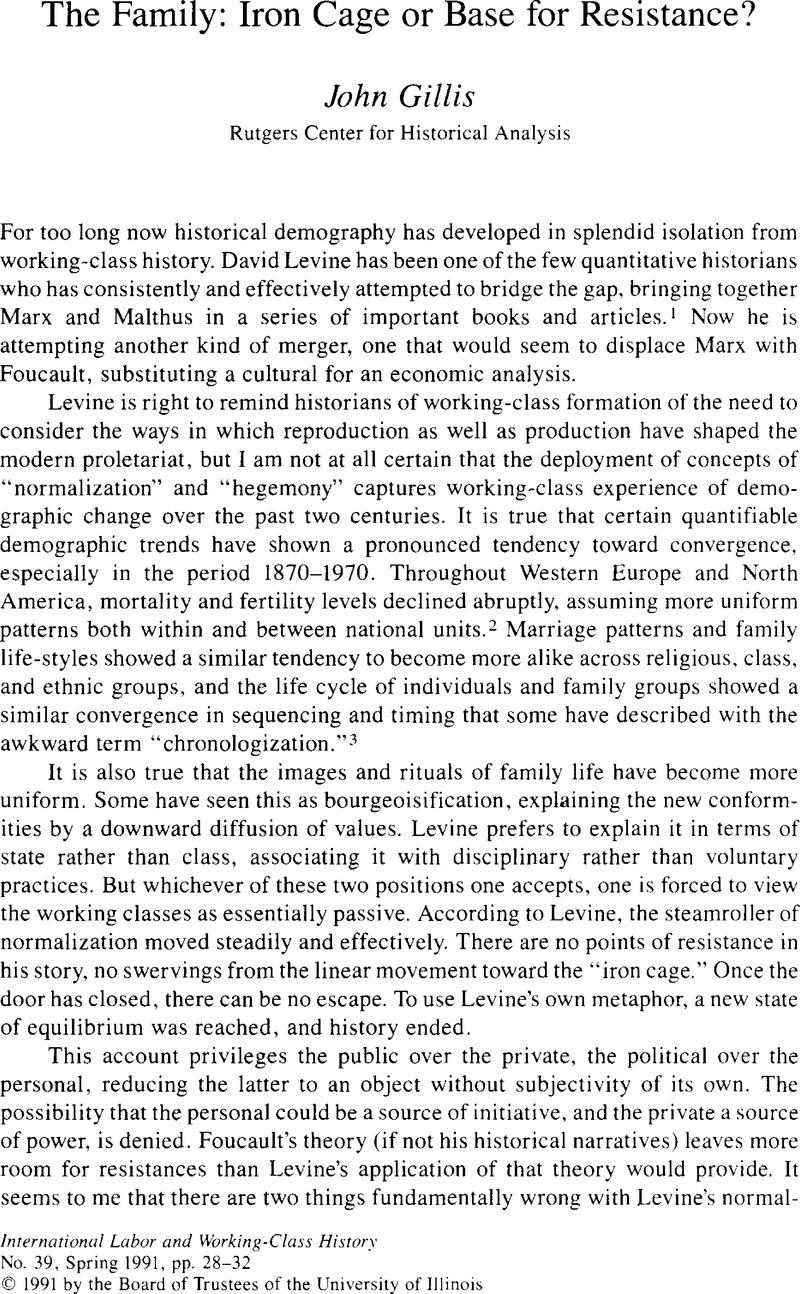No CrossRef data available.
Article contents
The Family: Iron Cage or Base for Resistance?
Published online by Cambridge University Press: 16 December 2008
Abstract

- Type
- Responses
- Information
- Copyright
- Copyright © International Labor and Working-Class History, Inc. 1991
References
NOTES
1. I wish to acknowledge my own personal debt to David Levine's friendship and scholarship. It is with the greatest respect for his work that I offer these criticisms. See his recent Reproducing Families: The Political Economy of English Population History (Cambridge, 1987)Google Scholar, as well as Family Formation in an Age of Nascent Capitalism (New York, 1977)Google Scholar and Proletarianization and Family History (New York, 1984).Google Scholar Levine has also co-authored, with Wrightson, Keith, Poverty and Piety in an English Village (New York, 1979)Google Scholar.
2. Watkins, Susan, “Conclusions,” in The Decline of Fertility in Europe, ed. Coale, Ansley J. and Watkins, Susan (Princeton, 1986), 420–50Google Scholar.
3. Kohli, Martin, “The World We Forgot: An Historical Review of the Life Course,” in Later Life: The Social Psychology of Aging, ed. Marshall, V. (Beverly Hills, 1985), 183–211Google Scholar; Hareven, Tamara, “The Life Course and Aging in Historical Perspective,” in Aging and Life Course Transition, eds. Hareven, and Davis, K. J. (New York, 1982)Google Scholar.
4. See Koonz, Claudia, Mothers in the Fatherland: Women, the Family and Nazi Politics (New York, 1987)Google Scholar, and de Grazia, Victoria, How Fascism Ruled Women (Berkeley, forthcoming)Google Scholar.
5. Hunt, Lynn, “The Unstable Boundaries of the French Revolution,” in A History of Private Life, ed. Perrot, Michelle, Vol. 4 (Cambridge, 1990), 13–46Google Scholar.
6. Glendon, Mary Ann, The Transformation of Family Law: State, Law, and Family in the United States and Western Europe (Chicago, 1989)Google Scholar.
7. Glendon argues that deregulation systematically advantages those with power, namely males. On the limits of the power of professionals, see Gordon, Linda, Heroes of their Own Lives: The Politics and History of Family Violence, Boston 1880–1960 (New York, 1988)Google Scholar.
8. Jacobson, Jodi L., The Global Politics of Abortion (Washington, 1990). 5Google Scholar.
9. See Duberman, Martin, Vicinus, Martha, and Chauncey, George Jr, eds. Hidden from History: Reclaiming the Gay and Lesbian Past (New York, 1989).Google Scholar
10. Gillis, John, “The Case against Chronologization: Changes in the Anglo-American Life Cycle, 1600 to the Present,” Ethnologia Europaea 17 (1988): 97–106Google Scholar; Harvey, David, The Condition of Postmodernity (Oxford, 1989), Part 3Google Scholar.
11. See the various essays in Tilly, Louise, Gillis, John, and Levine, David, eds. The Quiet Revolution: Western Europeans in the Age of Fertility Decline (Oxford, forthcoming)Google Scholar.
12. John Demos, “Images of the American Family, Then and Now,” and Skolnick, Arlene, “Public Images, Private Realities: The American Family in Popular Culture and Social Science.” in Changing Images of the Family, ed. Tufte, Virginia and Myerhoff, Barbara (New Haven, 1979), 43–60, 297–315Google Scholar For similar trends in Europe, see Frykman, Jonas and Lofgren, Orvar, Culture Builders: A Historical Anthropology of Middle-Class Life (New Brunswick, 1987)Google Scholar.
13. di Leonardo, Micaela, The Varieties of Ethnic Experience: Kinship, Class, and Gender among California Italian-Americans (Ithaca, 1984)Google Scholar.
14. Bausinger, Hermann, “Auf dem Wege zu einem neuen aktiven Heimatsverstandnis,” in Heimat heute ed. Wehling, Hans-Georg (Stuttgart, 1984), 11–27Google Scholar.


